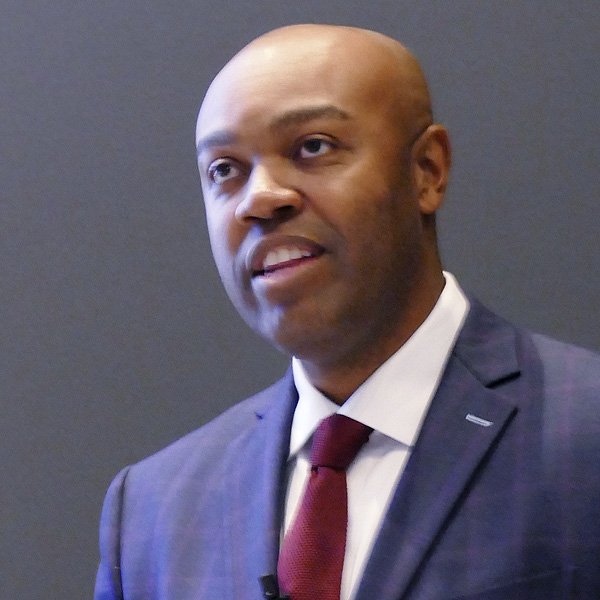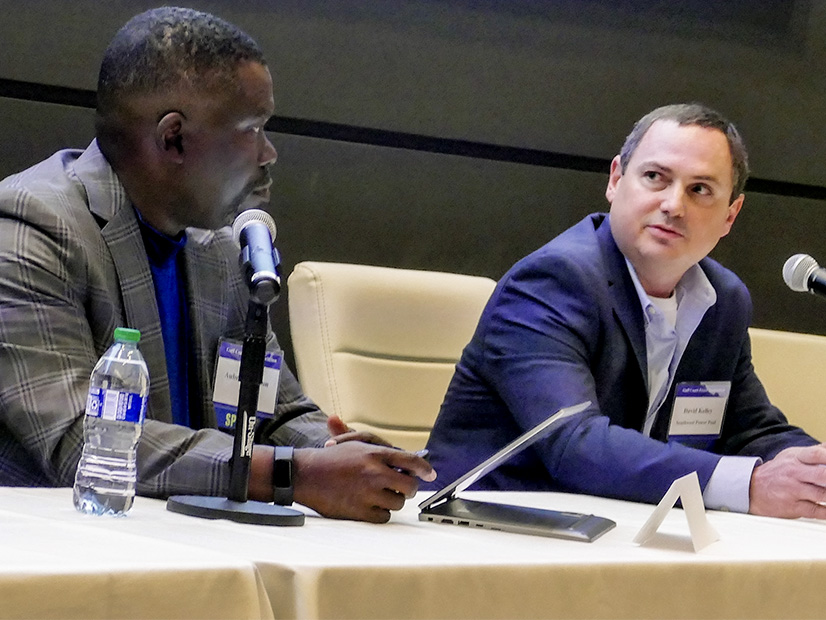NEW ORLEANS — Panelists at the Gulf Coast Power Association’s 9th Annual MISO/SPP Regional Conference March 8-9, which attracted a sellout crowd of 230 attendees, made links between long interconnection queue wait times, major transmission expansion, reliability worries, and the inexorable integration of renewable energy.
Terry Chambers, director of the Energy Efficiency and Sustainable Energy Center at the University of Louisiana at Lafayette, said there isn’t a route to achieving the state’s climate goals unless grid operators can bring generation projects online in a timely fashion.
He said MISO and SPP should share more information sooner and publicly so developers can make an informed decision on whether to enter their projects into the queue. He said MISO might recruit more staff to assist with processing and studying the queue.
Kelly Pearce, AEP’s managing director of integrated resource planning, agreed that “four- to five-year delays and the uncertainty” they breed for developers is frustrating.
Recurrent Energy’s managing director Robert Moore said he realized he and a colleague had spoken about the same issue in 2019. He said the dinner discussion then was largely the same as now, other than the fact they dined on grilled oysters instead of barbecue.
Moore said when he tells farmers and county officials they’ll have to wait five years to have certainty on revenue through solar projects “[they] look at me like I’m a moron.”
“I’ve been married long enough [to know] that you want to manage expectations,” Moore joked.
Advanced Power Alliance’s senior vice president of markets and infrastructure, Steve Gaw, said developers need new transmission capacity quickly. He said MISO’s long-range transmission planning (LRTP) is a “huge, huge advance” in incorporating more renewable energy.
“Certainty is the issue that most developers face. We need to get this transmission built earlier, and we need more certainty,” Gaw said. He added that developers enter queues without a firm estimate of their interconnection costs or how many restudies their projects will be subjected to.
Gaw said MISO’s and SPP’s efforts to reduce wait times has largely raised the developers’ financial risk by requiring more capital upfront.
“It just becomes a question of how long can you afford it and how long can your company afford it to know that your project is viable,” he said.
LRTP to Aid Transition
Increasing renewable energy is the thrust behind MISO’s ongoing LRTP effort.
“On July 25, 2022, we shook up the world,” MISO Vice President of System Planning Aubrey Johnson said, referencing the MISO Board of Directors’ approval of the first LRTP portfolio, valued at $10 billion. MISO has now embarked on a second portfolio again aimed at its midwest region. (See MISO Says 2nd LRTP Portfolio Still in Flux.)
Johnson said parties might have doubted the RTO’s ability to bring forward another comprehensive, forward-looking transmission portfolio after its 2011 slate of multi-value projects.
He said MISO envisions requiring about 330 GW of renewable energy over the next 20 years to meet goals set by states and members. That will require dramatic transmission expansion, he said.
“And I have a lot of people sitting on their hands. They take long breaks and take a lot of vacations,” Johnson joked of his overtaxed planning team.
Johnson said MISO needs to keep focus on “regulatory support” needs for long-range transmission expansion. He said MISO is counting on its incumbent developers to convey to state regulators how crucial LRTP projects are.
David Kelley, SPP’s vice president of engineering, said SPP is seeking to “innovate and completely transform” its transmission planning by using a consolidated process. He said SPP must devise “a fair and equitable manner” to divide the costs of an optimized grid. He added that SPP is being “very deliberate” about planning for more common extreme weather.
“We have to continue to learn from each other,” Kelley said.
Jim Dauphinais, an energy consultant representing multiple MISO end-use customers, said his clients are disappointed that MISO has already devised and is now coming up with a new cost allocation for LRTP projects. (See MISO to Test Long-range Tx Allocation Benefits.)
He said MISO had a durable and comprehensive cost-sharing method in its existing market efficiency project allocation and relies on adjusted production cost savings, avoided reliability projects, and savings when a project can reduce dependency on the transmission constraint between its Midwest and South regions.
“Somehow, that got tossed aside … That’s highly problematic,” he said. “There are tens of billions of dollars being talked about in transmission investment.”
Dauphinais called for a refocus on LRTP cost allocation and “a lot of care” in selecting which projects are needed now. He said cost-allocation challenges are behind MISO’s delay to plan LRTP projects in the south until it completes two planning rounds for MISO Midwest.
“Quite frankly, I believe, the cost-allocation issue is a sensitive issue for the MISO South commissions,” he said.
The Regulatory View
In a panel focusing on the regulators’ perspective of recent events, Kansas Corporation Commissioner Andrew French said the industry is realizing that one grid operator’s reliability risk affects another grid operator’s reliability status.
Michigan Public Service Commission Chairman Dan Scripps said MISO’s 2022/23 capacity auction, which resulted in a Midwestern shortfall, was “a wake-up call for MISO and the country.” He said the RTO’s LRTP portfolio represents “a best-in-class” transmission planning exercise to facilitate the generation fleet’s evolution.
 Michigan PSC Chairman Dan Scripps | © RTO Insider LLC
Michigan PSC Chairman Dan Scripps | © RTO Insider LLCBut Scripps said it’s currently taking too long to bring generation online through MISO’s queue process. He questioned whether the first LRTP planned projects are sufficient to meet the fleet evolution, “the ground literally moving under our feet.”
Scripps said he thought the second LRTP portfolio’s preliminary possibilities is a good start. He said the first two portfolios that focus on MISO Midwest should be relatively uneventful compared to the third and fourth packages in which planners will analyze MISO South’s transmission needs.
“I think it’s really interesting in terms of tranches three and four,” he said, saying the fourth portfolio is where MISO will get to the “holy land” of better connecting its Midwest and South regions. Scripps said MISO’s current postage-stamp allocation applying to Midwestern LRTP projects probably won’t pass muster in MISO South.
“That approach is one that, let’s say, hasn’t been fully embraced by people in [MISO] South,” he said.
But Scripps said a “free flow of electrons and benefits” between subregions is necessary for a unified MISO system.
“The current bifurcation of the MISO footprint does no favors, I think, on either side,” he said.
Louisiana Public Service Commissioner Davante Lewis, noting he was only 69 days into the job after upsetting incumbent Lambert Boissiere III in a December runoff, said his priorities include helping renewables gain quicker access to the grid, customer affordability and grid hardening. (See Lewis Upsets Boissiere for Seat on La. PSC.)
“I know we talk about how the contractors and developers can’t wait. People can’t wait,” Lewis said of more affordable energy.
Lewis warned that there’s an inflection point at which customer disconnections due to nonpayment will begin to accumulate.
MISO Counsel Calls for Collaboration
MISO Senior Vice President and General Counsel Andre Porter said the GCPA audience has “no other choice [but] to be a high-performing team” in managing the evolving grid. He said the alternative is to be territorial, insular companies, “dysfunctional” and “engaging in disputes [and] spending too much time solving to the last decimal place.”
Porter advised his listeners to collaborate, communicate openly and “check in with each other.”
 MISO Counsel Andre Porter | © RTO Insider LLC
MISO Counsel Andre Porter | © RTO Insider LLC“There are millions of people, companies outside this room relying on us,” Porter said. He said MISO has long believed there are “unsafe consequences of an uncoordinated transition.”
Porter said he is concerned over accredited capacity exiting the footprint and being replaced by even more gigawatts “coming online, but not providing that same level of high confidence.”
He said MISO’s staff vacancy rate is receding to normal levels, and he said the RTO is hiring the next generation that stands ready to tackle reliability challenges.
“There is a tremendous change and a revolution going on,” Gaw said, also stressing the need for parties to work together.
ACES Power Senior Vice President Jason Painter said that for the first time in his career, he’s witnessing reliability concerns take precedence over price considerations.
“Fixing the shortfall is No. 1,” he said.


